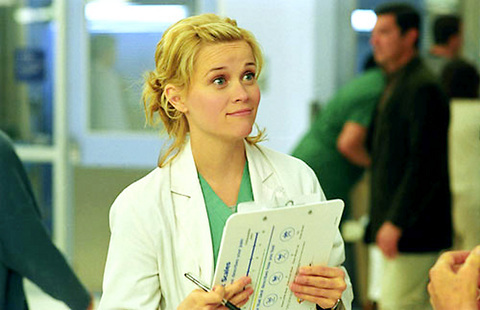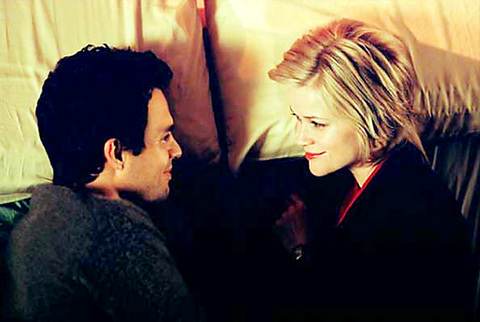Just Like Heaven, directed by Mark Waters from a script by Peter Tolan and Leslie Dixon, is a metaphysical second-chance comedy, the kind of movie in which the laws of time and space are bent to give characters access to self-knowledge unavailable in ordinary circumstances. The genre has a long and varied history, going back at least to It's a Wonderful Life and including Ghost, Big and the many versions of Heaven Can Wait. These movies always risk a certain sentimentality, but at their best -- Groundhog Day, All of Me, Waters' splendid remake of Freaky Friday -- they leaven teary lesson-learning with a whimsical delight in the ridiculous.
Just Like Heaven, which stars Reese Witherspoon as an ambitious San Francisco doctor and Mark Ruffalo as a mopey fellow who sublets her apartment, is a bit too thin and gooey to be counted among such classics. Given its somewhat morbid premise, though, it is also impressively nimble and cheery. At the beginning, Elizabeth Masterson (Witherspoon) completes a marathon emergency room shift (compressed by Waters and his brilliant editor, Bruce Green, into a tour de force of breakneck comic exposition) and is promptly involved in a car accident. A bit later, Elizabeth -- or rather her immaterial but nonetheless talkative spirit -- barges in on David Abbott (Ruffalo), who has been shuffling around her old home, drinking beer and glancing at her spectacular views of the city and its bay. What, she wants to know, is he doing in her apartment? He asks her the same question.
Their initial encounters suggest The Goodbye Girl redone as a ghost story. Elizabeth, being the ghost in question, does not hang her underwear on the shower curtain to dry, but she does have a habit of walking into the bathroom when David is showering. If the two of them were a single person, you might describe that person as passive-aggressive, but as it is, Witherspoon, scolding and blustering, sees to the aggression, while Ruffalo, once again, turns passivity into an unlikely form of charm. After a while, predictably but winningly, their oil-and-water coexistence emulsifies into love, and they join forces to figure out just what happened to Elizabeth, whose memory of her physical life is conveniently cloudy.

PHOTO COURTESY OF FOX MOVIES
The two of them are not hard to like. Witherspoon sheds the mock ditziness she experimented with in the Legally Blonde movies, and in the early scenes (which might have been called Medically Blonde), she rediscovers the chipper steeliness of Tracey Filck in Election, her first great comic role. In some ways, Elizabeth, who must be both mockable and lovable, is a greater challenge, but Witherspoon is up to it. And Ruffalo, with his stoner drawl and his sad-sack gallantry, is an ideal foil.
Adapted from a novel by the French spiritual writer Marc Levy, Just Like Heaven spins its fluffy conceits in the crossfire of the US culture wars. Without giving too much away, I will note that the movie performs the astonishing feat of taking the contentious issues surrounding the life and death of Terri Schiavo and turns them into the stuff of farce. Waters must have the lightest touch in Hollywood, an enviable and perhaps unnerving ability to wring belly laughs out of grief, ethical difficulty and medical horror.
The supporting cast certainly helps, in particular Donal Logue, who plays David's friend and therapist; Jon Heder (the goofy hero of Napoleon Dynamite) as his unlikely spiritual adviser; and Dina Waters as Elizabeth's older sister. They all perform with a liveliness that keeps the more mawkish elements of the story at bay, though these inevitably assert themselves at the end, when the camera lens seems to be submerged in corn syrup, and lumps rise, on cue, in throats. It's not heaven, exactly, but after the purgatory of the late summer movie season, it may be close enough.

PHOTO COURTESY OF FOX MOVIES

On April 26, The Lancet published a letter from two doctors at Taichung-based China Medical University Hospital (CMUH) warning that “Taiwan’s Health Care System is on the Brink of Collapse.” The authors said that “Years of policy inaction and mismanagement of resources have led to the National Health Insurance system operating under unsustainable conditions.” The pushback was immediate. Errors in the paper were quickly identified and publicized, to discredit the authors (the hospital apologized). CNA reported that CMUH said the letter described Taiwan in 2021 as having 62 nurses per 10,000 people, when the correct number was 78 nurses per 10,000

As we live longer, our risk of cognitive impairment is increasing. How can we delay the onset of symptoms? Do we have to give up every indulgence or can small changes make a difference? We asked neurologists for tips on how to keep our brains healthy for life. TAKE CARE OF YOUR HEALTH “All of the sensible things that apply to bodily health apply to brain health,” says Suzanne O’Sullivan, a consultant in neurology at the National Hospital for Neurology and Neurosurgery in London, and the author of The Age of Diagnosis. “When you’re 20, you can get away with absolute

May 5 to May 11 What started out as friction between Taiwanese students at Taichung First High School and a Japanese head cook escalated dramatically over the first two weeks of May 1927. It began on April 30 when the cook’s wife knew that lotus starch used in that night’s dinner had rat feces in it, but failed to inform staff until the meal was already prepared. The students believed that her silence was intentional, and filed a complaint. The school’s Japanese administrators sided with the cook’s family, dismissing the students as troublemakers and clamping down on their freedoms — with

As Donald Trump’s executive order in March led to the shuttering of Voice of America (VOA) — the global broadcaster whose roots date back to the fight against Nazi propaganda — he quickly attracted support from figures not used to aligning themselves with any US administration. Trump had ordered the US Agency for Global Media, the federal agency that funds VOA and other groups promoting independent journalism overseas, to be “eliminated to the maximum extent consistent with applicable law.” The decision suddenly halted programming in 49 languages to more than 425 million people. In Moscow, Margarita Simonyan, the hardline editor-in-chief of the